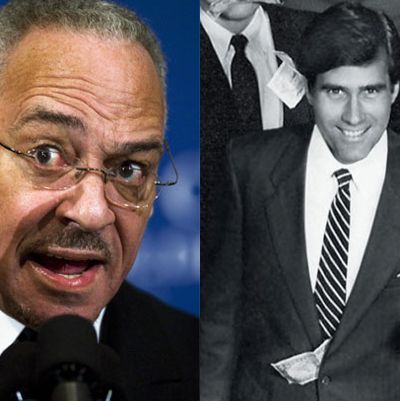
Two stories have dominated the presidential campaign over the last week. The first was a proposed, and quickly aborted, Republican advertising campaign focused on Jeremiah Wright. The second is an ongoing Obama ad campaign highlighting the human cost of Mitt Romney’s tenure at Bain Capital. In some ways, these are actually the same story: elites in both parties recoiling at the populism of their own voting bases.
First we had Joe Ricketts, a conservative billionaire, entertaining a wild plan to dump millions on inflammatory ads painting Obama, via Wright, as a kind of alien figure. The Republican base considers the supposition perfectly obvious, but in the milieu in which a figure like Ricketts circulates, it is deeply disreputable. Conservative millionaires may fear and despise Obama, and they will indulge the most radical and crude economic theories, but they are loath to associate themselves with any taint of racial or cultural backwardness. Ricketts’s statement disowning the campaign is instructive: “Joe Ricketts is a registered independent, a fiscal conservative, and an outspoken critic of the Obama Administration.”
The same dynamic has made numerous Democrats — most prominently Cory Booker, but also several others — so nervous about criticizing private equity. Many Democratic (and even, as evidenced by the issue’s appearance in the GOP primary, Republican) voters think of private equity as “vulture capitalism.” But if you’re a Democratic member of Congress, especially one from a coastal banking center, private equity is your people. You do not want to be seen as one of those crude, populist Democrats pitting the middle class against the rich. You may be comfortable with a label like “socially liberal,” but you want to be known as a fiscal moderate or a pro-business or modernizing sort of Democrat.
Now, the two stories are not perfectly parallel. Obama’s ads are much less inflammatory, and he’s continuing to run them. But the underlying discomfort provoked by both campaigns shows the same thing at work: The Democratic and Republican party elites are much more libertarian than their rank-and-file.
That makes it harder for both campaigns to fully exploit the populist messages otherwise available to them. The biggest constraint on a campaign’s ability to drive a message is the general sense of what is in or out of bounds. And that sense, in turn, is largely defined by the willingness of members of a party to call out their own candidate for going too far. The socially liberal, economically conservative sensibilities of the party elites are working in tandem to hold back Republicans from attacking Obama on cultural grounds, and to at least complicate Obama’s populist attacks on Romney’s business career.






























